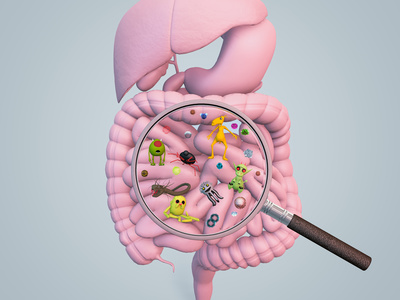Cardiovascular diseases are the most common cause of death in Germany. They cause around 40 per cent of all deaths in this country. In addition to the high mortality rate, cardiovascular diseases can severely impair the quality of life of those affected. Vascular inflammation can lead to cardiovascular diseases such as atherosclerosis (hardening of the arteries) and atherothrombosis (blood clots in the arterial vascular system caused by inflammation). Cholesterol metabolism and the blood cells formed in the bone marrow, which migrate into the bloodstream, influence the development of vascular inflammation. These are processes that are modulated by the microorganisms in the intestine, the intestinal microbiome.
"Little research has been carried out to date into exactly how the relationships are organised and how the mechanisms behind them work. Our research project aims to shed light on these cellular backgrounds," explains Prof. Dr Christoph Reinhardt, research group leader at the Centre for Thrombosis and Haemostasis (CTH) of the Mainz University Medical Center and Fellow at the Gutenberg Research College of the Johannes Gutenberg University Mainz. It is well known that diet has an influence on cardiovascular health. Current studies show that people who eat a high-fibre diet have a lower risk of developing cardiovascular disease.
"The increasing problem in Western countries is that too little fibre and too much food containing sugar and fat are consumed. This can lead to the so-called metabolic syndrome, i.e. the joint occurrence of obesity, high blood pressure and sugar and fat metabolism disorders. These are all risk factors for cardiovascular disease," emphasises Professor Reinhardt.
Fibre, especially from vegetables and wholemeal products, is converted into short-chain fatty acids by certain bacteria in the intestinal microbiome. One of these metabolic products, known as propionic acid, reduces the concentration of fats in the blood, such as cholesterol. "High blood lipid levels are one of the main drivers of vascular inflammation. Propionic acid could therefore be a promising substance for new therapeutic approaches for cardiovascular diseases," says Professor Reinhardt.
The researchers are focussing on the liver as a metabolically active organ. Another focus of research is the bone marrow, which as a haematopoietic system also plays a key role in cardiovascular health.
"The gut microbiome not only influences metabolism, but also the formation of blood cells in the bone marrow, known as haematopoiesis, and in particular myelopoiesis, i.e. the formation of myeloid cells that normally fight bacteria, for example. As part of our joint project, we will investigate how the microbiome influences the vessels in the bone marrow, how it regulates myelopoiesis and also how the newly formed platelets enter the bloodstream - all important aspects for cardiovascular health," explained Prof. Dr Daniela Krause, Director of the Institute of Transfusion Medicine - Transfusion Centre of the Mainz University Medical Center.
In order to be able to study individual bacterial species in detail among the multitude of intestinal bacteria, the researchers use a special examination method known as gnotobiotics. This enables them to specifically analyse individual bacterial interactions and their influence on the liver and bone marrow under aseptic conditions in an animal model.
An interdisciplinary team of researchers from the Centre for Thrombosis and Haemostasis, the Centre for Cardiology - Cardiology I and the Institute of Transfusion Medicine - Transfusion Centre of the Mainz University Medical Centre have joined forces for the DZG joint project. The research consortium is complemented by scientists from the Technical University of Dresden (Prof. Dr Triantafyllos Chavakis) and Charité - Universitätsmedizin Berlin (PD Dr Arash Haghikia). The researchers in the joint project also belong to various German Centres for Health Research: the German Centre for Cardiovascular Research (DZHK), the German Centre for Diabetes Research (DZD) and the German Consortium for Translational Cancer Research (DKTK).
The DZG Innovation Fund (DZGIF) is a joint research funding programme of the German Centres for Health Research. It supports cross-disease research ideas that can advance knowledge on the prevention and treatment of common diseases. The aim of the DZGIF is to network researchers, facilitate joint research and thus create interdisciplinary synergies between the DZGs. A total of eight applications were submitted for the second call of the funding programme on the topic of "Microbiome". The Mainz-based joint project "The gut microbiome as a functional modifier of myelopoiesis and inflammatory vascular endothelial phenotypes in cardiometabolic disease" is one of the two projects that were selected for funding due to their outstanding evaluation.
Further information on the DZG innovation fund.
Scientific Contact:
Univ.-Prof. Dr. Christoph Reinhardt (christoph.reinhardt(at)unimedizin-mainz.de), Centrum für Thrombosis and Hemostasis (CTH), University Medicine Mainz
Univ.-Prof. Dr. Daniela Krause (daniela.krause(at)unimedizin-mainz.de), Institute for Transfusion Medicine, University Medicine Mainz
Source: Press release University Medical Center of the Johannes Gutenberg University Mainz (in German only)


